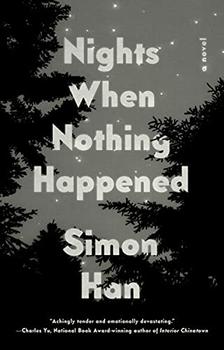Summary | Excerpt | Reviews | Beyond the book | Read-Alikes | Genres & Themes | Author Bio

A quiet atmosphere of dread permeates Simon Han's subdued debut novel Nights When Nothing Happened. It begins with an anxiety inducing premise — 11-year-old Jack Cheng has discovered that his five-year-old sister Annabel is sleepwalking at night, once even strolling out the front door of their house and wandering the neighborhood. Jack does not tell his parents, Patty and Liang, about these late-night excursions, instead taking it upon himself to be his sister's protector, even if it means standing sentinel when he should be sleeping himself. The family lives in Plano, Texas (see Beyond the Book), a city they chose in part for its low crime rate, but each character is vaguely anxious of some unspecified danger. When a legitimate threat finally materializes, though, it is entirely of the Chengs' own making.
Patty and Liang met in Tianjin, a city in northeast China, at Patty's college graduation where she was top of her class in the physics department. They came to America shortly after marrying and having their son. Jack stayed behind in China with Patty's parents, coming to the United States himself at age five, just as Patty and Liang were preparing for Annabel's birth. These early years without his parents seem to have diminished Jack's connection to them. Liang is aloof and withdrawn and Patty is a workaholic who rarely spends quality time with her kids. Both parents are distracted by the strain in their marriage and Annabel's insistence on sleeping in their bed with them, and they fail to recognize that their daughter has developed some worrisome behavioral issues. These issues reach a crisis point at a holiday gathering and the repercussions leave the family more divided than ever before.
Annabel's nocturnal behavior is a metaphor for the ways in which the Chengs, particularly the parents, are sleepwalking through their lives. Neither Patty nor Liang understands either of their children. Patty admires Jack's stoicism and maturity, failing to comprehend that he has grown up fast and become almost pathologically vigilant because he has hardly been parented. Annabel convinces her parents to let her sleep in their bed, yet they don't see her manipulation tactics for what they are until her behavior almost ruins them. Han's characterization of Patty and Liang is expert; their parental negligence is fully explored as a consequence of their personal insecurities and backstories. Patty is singularly focused on her work because it gives her confidence and a sense of purpose. Liang's mother died when he was young and he was raised by an abusive, often absent father. Thus he had no model from which to learn how to be a parent. It's also easy to empathize with Jack's chronic anxiety, but the reader might, as Patty does at one point, think Annabel ought to be slapped.
Han's novel is fundamentally a story about an immigrant family, but how this aspect of the Chengs' lives might relate to Annabel's behavioral issues or the problems in Patty and Liang's marriage remains ambiguous, just outside the narrative frame. Liang and Patty have a predominantly Chinese social circle, and the only instances of either child having trouble with peers at school are those of Annabel's own making. For reasons that are not explained, Annabel, the only one of the Chengs born in America, comes to believe that China is literally hell (and, after a trip to the JFK assassination museum, that Lee Harvey Oswald lives there). Perhaps she believes it must be a terrible place because her parents left, or perhaps she has absorbed some sort of negative cultural message about China at home or elsewhere. When she repeats this belief to some other students at school, a girl named Jill Wu challenges her, declaring that her mother says China is much better than the United States. Annabel, furious at being contradicted, responds by shouting at Jill, "You're such a Lee Harvey Oswald!" Despite the generally dark mood throughout the book, there are occasional such moments of charming humor.
Some readers may be irritated by the abundance of subtlety in Nights When Nothing Happened. The novel's title is apt; there is nothing much happening here and that can make for slow reading occasionally. Taken for what it is, though — a vivid and realistic character study of a family devastated by a lack of genuine empathy and intimacy — it is a remarkable achievement.
![]() This review was originally published in The BookBrowse Review in January 2021, and has been updated for the
January 2022 edition.
Click here to go to this issue.
This review was originally published in The BookBrowse Review in January 2021, and has been updated for the
January 2022 edition.
Click here to go to this issue.

If you liked Nights When Nothing Happened, try these:

by Amanda Bestor-Siegal
Published 2023
Set in a wealthy Parisian suburb, an emotionally riveting debut told from the point of view of six women, and centered around a group of au pairs, one of whom is arrested after a sudden and suspicious tragedy strikes her host family - a dramatic exploration of identity, class, and caregiving from a profoundly talented new writer.

by Eric Nguyen
Published 2022
A stunning debut novel about an immigrant Vietnamese family who settles in New Orleans and struggles to remain connected to one another as their lives are inextricably reshaped.
Your guide toexceptional books
BookBrowse seeks out and recommends the best in contemporary fiction and nonfiction—books that not only engage and entertain but also deepen our understanding of ourselves and the world around us.